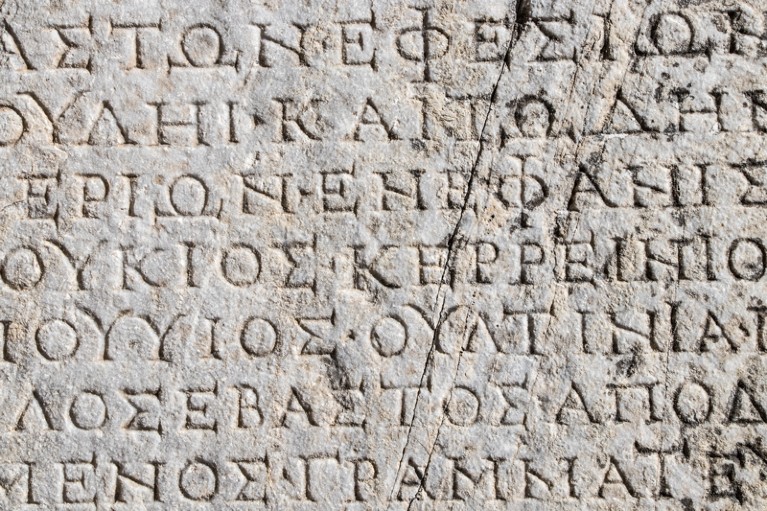
Coronavirus variants will now be named using Greek letters.Credit: Shutterstock
It has taken nearly six months, but the World Health Organization (WHO) last week announced the first iteration of its naming system for two kinds of coronavirus variant, to be used in public communications.
An expert committee advising the WHO recommended using the Greek alphabet to describe ‘variants of interest’ — which are coronavirus strains that lead to increased infections locally — as well as the more dangerous ‘variants of concern’.
The long-awaited system is intended for use by the media, policymakers and the public — and is published in Nature Microbiology (F. Konings et al. Nature Microbiol. https://doi.org/10.1038/s41564-021-00932-w; 2021). It should have come earlier, because its absence has fuelled the practice of naming variants after the places in which they were discovered — such as the ‘Kent variant’, which is otherwise known as B.1.1.7. Under the WHO’s new system, B.1.1.7 is also called Alpha. The B.1.617.2 lineage, first identified in India, is now called Delta.
The new system is both a more user-friendly alternative and designed to reduce the geographical stigma and discrimination that can come from associating a virus with a place. It’s also important because, when countries are singled out by news organizations that have millions of readers and viewers, governments can become hesitant. They might delay collecting data on coronavirus strains, or announcing new variants, to avoid what they perceive as negative publicity or the risk of being blamed for creating a variant.
The new system does not change the alphanumeric nomenclature systems that researchers use. It also does not prevent the naming of a location where a virus variant has been identified, for example to indicate areas where variants are spreading. What it does do is provide an alternative to names that mean little to people outside research.

Coronavirus variants get Greek names — but will scientists use them?
At Nature, we will for now be using both the Greek letters and the nomenclature used by researchers, depending on the context, and will continue to avoid labelling variants by their geographical origin.
Nature’s news team polled readers on whether they would use the new system. Most of the 1,362 respondents indicated that they would — depending on the context. However, around 15% said they would continue to use geographical descriptors. And more than a week after the WHO’s announcement, some media organizations and prominent people are continuing to identify variants by geographical place names. That needs to end. The letters of the Greek alphabet are well known to international media and policymakers.
The WHO system’s authors will be aware that theirs is a temporary solution. The WHO has already used 10 of its 24 letters to describe 6 variants of interest and 4 variants of concern that have been identified since December 2020. This means that a new naming system might need to be found.
Developing a naming system that is clear, intelligible and can work across cultures and languages is a complex process — which is one reason it has taken so long for the WHO’s advisers to come up with its present solution. The World Meteorological Organization faces an analogous problem. It has a rotating list of 21 names for storms, such as Dolly and Omar. It also has a reserve list of all 24 Greek letters that it uses when the names in its standard list run out. But in March, it announced that it is retiring the Greek letters from its reserve list and adopting a new system of A–Z names, including Aidan and Zoe. The reason, it says, is that Greek letters can cause confusion when translated into other languages, and that some letters — such as eta and theta — sound alike and might be confused with each other.
The WHO’s advisers need to keep working on the next iteration so that it is ready to be deployed when required, and they should consider alphabets from other languages. Their present solution, although not perfect, is a simple, straightforward alternative for variants that are otherwise being named after places. It will reduce the use of geographical origins as the default when referring to variants, and thus avoid an unintended stigma.

 Coronavirus variants get Greek names — but will scientists use them?
Coronavirus variants get Greek names — but will scientists use them?
 The world needs a single naming system for coronavirus variants
The world needs a single naming system for coronavirus variants







